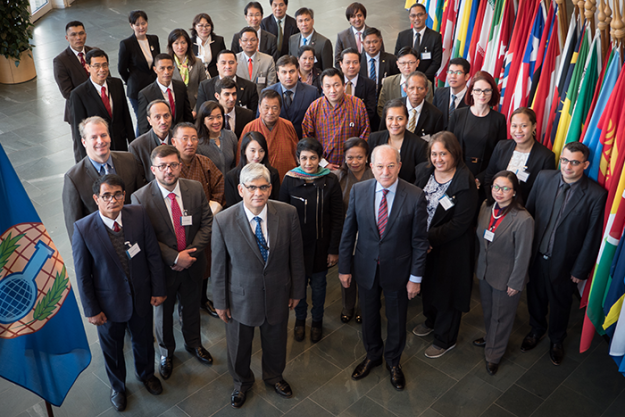
Participants at the Stakeholders Forum for States Parties in Asia on the Adoption of National Implementing Legislation of the Chemical Weapons Convention (CWC)
THE HAGUE, Netherlands — 17 November 2017 — States Parties from Asia gathered to carve a path towards the adoption of national legislation regarding chemical weapons during the forum held in The Hague from 13 to 15 November.
The Stakeholders Forum for States Parties in Asia on the Adoption of National Implementing Legislation of the Chemical Weapons Convention (CWC) provided a platform for 12 countries to discuss challenges and good practices in the process of adopting the CWC national implementing legislation.
The Deputy Director-General of the Organisation for the Prohibition of Chemical Weapons (OPCW), Mr Hamid Ali Rao, emphasised in his opening remarks that “to effectively guarantee that chemicals are used only for peaceful purposes, all States Parties must work together to make sure that there are no gaps or lacunas in our laws that can be exploited for prohibited ends”.
States Parties that are yet to adopt legislation with all the initial measures – including Afghanistan, Bhutan, Mongolia, Myanmar, Nepal, Philippines, Samoa, and Timor-Leste – provided updates on their progress, discussed challenges and formulated national roadmaps towards adoption.
Australia, Bangladesh, Japan and Jordan, which had already adopted the CWC implementing legislation, shared their experiences and lessons learned during the political and legislative process.
Japan highlighted the 1995 chemical attacks in Tokyo as a clear reminder of the rising risk posed by non-State actors and the necessity for adopting national implementing legislation.
The participants identified a number of challenges facing the universal adoption of national legislation of the CWC, including competing national priorities, unfamiliarity with the CWC, and low levels of involvement from stakeholders such as Government decision-makers and the chemical industry.
Enhancing regional cooperation, state-to-state support, and facilitation by the OPCW Technical Secretariat were listed among the measures to overcome these challenges.
Background
This is the third regional Stakeholders Forums for States Parties on the Adoption of National Implementing Legislation of the Chemical Weapons Convention (CWC) held in 2017, after the Forum held in Cameroon (for Africa) and in Chile (for the Latin American and Caribbean counties) in September. The main objective of the Forums is to contribute to greater awareness of national stakeholders about the significance of the national implementing legislation, and to develop national roadmaps towards the adoption of the national legislation.
As of August 2017, 153 out of 192 States Parties to the CWC (78 per cent) have adopted national implementing legislation. Out of 53 States Parties in Asia, 31 (58 per cent) have adopted legislation covering all initial measures, nine (17 per cent) have adopted legislation covering some of the initial measures, and 13 countries (25 per cent) have yet to adopt implementing legislation.
As the implementing body for the Chemical Weapons Convention, the OPCW oversees the global endeavour to permanently eliminate chemical weapons. Since the Convention’s entry into force in 1997 – with its 192 States Parties – it is the most successful disarmament treaty eliminating an entire class of weapons of mass destruction.
Over 96 per cent of all chemical weapon stockpiles declared by possessor States have been destroyed under OPCW verification. For its extensive efforts in eliminating chemical weapons, the OPCW received the 2013 Nobel Prize for Peace.
